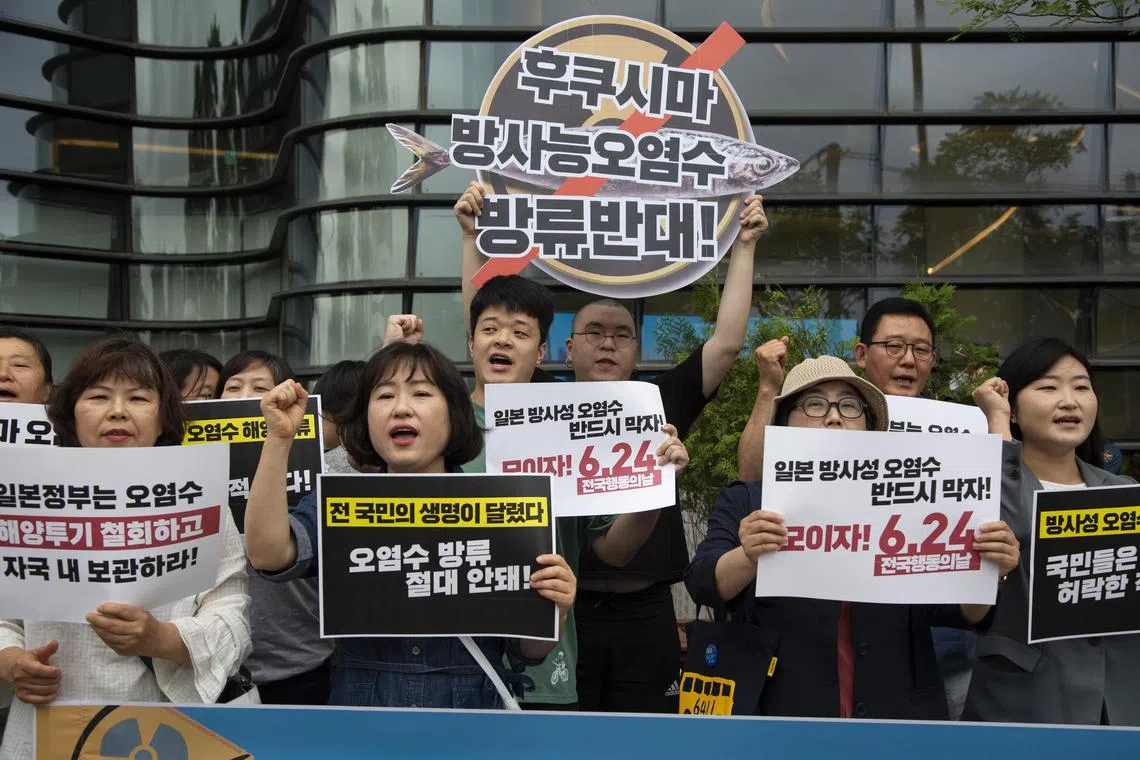South Korea sea salt demand grows ahead of Japan’s Fukushima treated wastewater release
Sign up now: Get insights on Asia's fast-moving developments

More than 85 per cent of the South Korean public oppose Japan’s plan to release treated wastewater from the destroyed Fukushima power plant.
PHOTO: EPA-EFE
Follow topic:
SEOUL - Ahead of Japan’s planned release of treated wastewater
South Korea’s fisheries authorities have vowed to ramp up efforts to monitor natural salt farms for any rise in radioactive substances and maintain a ban on seafood from the waters near Fukushima.
But their efforts have not stopped some people from buying a lot more than they need, worried about the potential health hazards stemming from Japan’s move.
“I worry the release of wastewater could not only pollute (the ocean) and lead to health problems but also raise salt and seafood prices,” Ms Park Young-sil, a 67-year-old woman, said as she shopped at a traditional market in Seoul.
While Seoul and Tokyo have taken steps in recent months to mend ties marred by historic disputes, Japan’s plan to release more than a million tonnes of treated wastewater from the destroyed Fukushima power plant remains contentious for its closest neighbour.
More than 85 per cent of the South Korean public oppose Japan’s plan, according to a survey in May by local pollster Research View.
Seven in 10 people said they would consume less seafood if the treated wastewater release goes ahead.
Mr Hyun Yong-gil, an owner of a wholesale salt store in Seoul, said sales have risen by “40 to 50 per cent” in recent days while prices are also going up.
“We are getting more customers than usual lately and many of them seem worried about the planned wastewater release,” he said.
Sea salt prices have gone up by nearly 27 per cent in the first week of June from two months ago, according to South Korea’s Ministry of Oceans and Fisheries. But the ministry attributed the uptick in price more to poor weather in recent months and a fall in production, not to panic buying.
“With a long rainy season during the spring, there has been growing anxiety among producers,” the ministry said on Tuesday.
Sea salt was a trending topic on an online shopping website run by the country’s National Federation Of Fisheries Cooperatives on Friday. Social media posts talking about buying salt in large amounts and urging people to do the same have also gone viral.
“We have bought three years’ worth of seaweed and anchovies and a big bag of salt,” one viral tweet in Korean said.
Order volumes and inquiries about buying salt have increased as of late, according to the local branches of the National Agricultural Cooperative Federation known as Nonghyup in Sinan county, a region famous for producing sea salt.
Shares of salt and seafood manufacturers have rallied in South Korea in recent days.
Insanaga, a small and medium-sized enterprise specialising in salt products, saw a 28 per cent rise in shares on Wednesday. Canned tuna maker Sajo Seafood also saw its shares rise by more than 6 per cent.
The jump in shares came after a report by Japan’s public broadcaster NHK earlier this week, that an underwater tunnel which has been built to release Fukushima wastewater into the ocean had been filled with seawater.
Japan plans to dump more than one million tonnes of treated water that was mainly used to cool the reactors at the Fukushima plant into the sea by this summer. REUTERS

